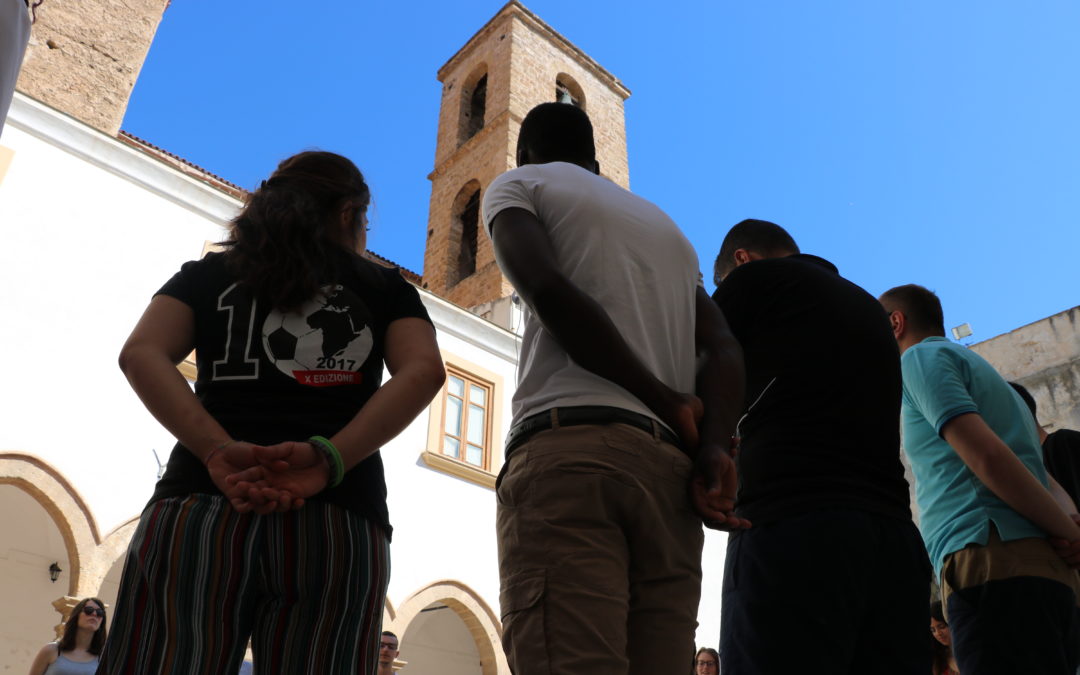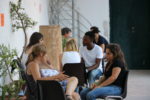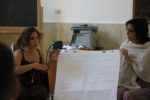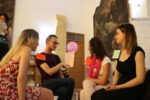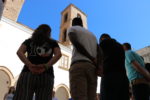Nome progetto: “LILI-Living Library for Social Inclusion”
Durata: 7 mesi, dal 01-03-2017 al 30-09-2017. Training Course a Palermo dal 22 al 29 giugno 2017.
Ente capofila: CEIPES
Organizzazioni partner: Pistes Solidaires Méditerranée, CEIPES Armenia, Grupo de Jovens Novo Mundo, Youth with a international vision, Youth for Social Changes, CEIPES Greece, GRUPA “HAJDE DA…”, CENTRUL DE RESURSE PENTRU ADULTI SI TINERI. Finanziato da: ERASMUS + KA1 – Learning Mobility of Individuals Youth mobility
Num. progetto: 2016-3-IT03-KA105-009929
Tra il 22 e il 29 Giugno 2017, si è tenuto a Palermo il corso di formazione del progetto “LILI- Living Library for social inclusion”. La partecipazione ha visto coinvolti giovani provenienti da diversi paesi, quali Romania, Albania, Georgia, Armenia, Portogallo, Grecia, Francia.
Discriminazione, pregiudizi e stereotipi: questi tra i principali temi affrontati, nell’ottica più generale di favorire la creazione di una società più inclusiva, basata sul dialogo tra le culture, sull’empatia e sul rispetto delle diversità, attraverso lo strumento narrativo della “biblioteca umana”.
La prima sessione del corso ha avuto per oggetto la conoscenza e la formazione del gruppo: l’utilizzo dei metodi e delle tecniche dell’educazione non-formale ha facilitato il processo e sin da subito i partecipanti hanno avuto la possibilità di potersi esprimere in piena libertà; tutto ciò è stato funzionale per poter affrontare il primo tema del training: le migrazioni.
Da riflessioni personali dei partecipanti, attivate attraverso la tecnica del Digital storytelling, sono emersi diversi significati sul concetto di “migrante”, contribuendo alla costruzione di un pensiero comune e condiviso circa il carattere multidimensionale e soggettivo dello stesso.
Il tema delle migrazioni e delle dinamiche di inclusione-esclusione sociale dei cittadini stranieri è stato oggetto di esplorazione della seconda giornata di lavoro; durante questa giornata sono state fornite diverse nozioni teoriche per consentire ai partecipanti di poter comprendere meglio alcuni aspetti del concetto di discriminazione, pregiudizio e stereotipo, e riflettere sulle variabili socioeconomiche che ne influenzano il radicamento. Il gruppo ha avuto un ruolo attivo anche durante la partecipazione all’evento locale, tenutosi presso l’Arci Porco Rosso, durante il quale hanno preso parola diversi esponenti che, a Palermo e nel Mediterraneo, operano a vario titolo nel contesto della migrazione; interessanti e suggestivi, gli interventi dei partecipanti, che hanno condiviso la propria esperienza lavorativa e personale, hanno fornito diversi spunti di riflessione in relazione ai contesti socio-culturali di provenienza.
Dal terzo giorno si entra nel vivo della biblioteca vivente: fondamentale per la sua riuscita è stato il lavoro di gruppo; ma ovviamente possono verificarsi situazioni di contrasto e si è riflettuto su quali potessero essere e su come affrontarle nel migliore dei modi. A ciò hanno sicuramente contribuito i gruppi di riflessione, che si sono tenuti ogni giorno a fine sessione, per far sì che il gruppo esprimesse le proprie sensazioni all’interno di un contesto sicuro, di ascolto e dialogo.
I partecipanti hanno dovuto affrontare diverse sfide: non solo le dinamiche del lavoro di gruppo, ma anche il confronto con aspetti emotivi che sono emersi durante la fase di preparazione, soprattutto all’interno del gruppo dei “Libri”; ma tale emotività e la volontà di condividere hanno fatto si che i libri, con il supporto di tutto il gruppo, abbiano potuto svolgere il loro ruolo nel miglior modo.
Simulazioni, role playing per la gestione dei conflitti, lavoro di gruppo, sono stati fondamentali durante la formazione dei partecipanti e ciò ha consentito loro di acquisire gli strumenti necessari per la realizzazione della biblioteca.
Tutto pronto per l’evento del 27 Giugno, “LILI – Una biblioteca vivente per tutta Europa”: tra bibliotecari, assistenti, lettori e libri, si è realizzato un momento di grande condivisione, attraverso racconti di vita, che hanno consentito di far luce su tematiche diverse, quali la disabilità, il razzismo, la guerra, l’inclusione sociale, la religione.
I lettori hanno avuto la possibilità, non solo di “leggere” i libri, ma soprattutto di interagire con loro, attraverso domande e curiosità, cercando di abbattere stereotipi e pregiudizi. Sapori, suoni, colori differenti, provenienti da tutto il mondo hanno chiuso la giornata con la serata interculturale.
Il progetto, attravero lo strumento della “Living Library”, aveva tra i suoi obiettivi principali quello di migliorare la conoscenza di processi e strategie, funzionali all’inclusione dei migranti e dei rifugiati, e quello di approfondire la comprensione dei processi di rappresentazione, stereotipizzazione, nascita dei pregiudizi e della discriminazione.
Dalla valutazione finale del gruppo è emerso che il training course sia riuscito a raggiungere tali obiettivi, ma soprattutto ha contribuito alla formazione di un gruppo che si è dimostrato coeso e attivo, nel perseguire il comune obiettivo: sostenere la costruzione di un’Europa nuova basata sulla coesione sociale e il dialogo.
Ma la biblioteca vivente non finisce qui! I nostri partecipanti adesso avranno il compito di riportare le conoscenze acquisite all’interno delle proprie organizzazioni e realizzare nei propri paesi delle biblioteche viventi: ha inizio la fase FOLLOW UP!
***ENGLISH VERSION***
“DON’T JUDGE A BOOK BY ITS COVER”: Between 22 and 29 June 2017, in Palermo, it was held the training course of the project “LILI- living library for social inclusion”. Participation has involved young people coming from different countries, such as Romania, Albania, Georgia, Armenia, Portugal, Greece, France.
Discrimination, prejudices, stereotypes: these were the main topics addressed, in the broader perspective of fostering the creation of a more inclusive society, based on dialogue between cultures, empathy and respect for diversity, through the narrative instrument of the “human library”.
The first session of the course focused on the formation of the group and to allow participants to know each other: using methods and techniques of non-formal education facilitated the process and, right from the start, participants had the opportunity to feel free expressing themselves; all this was functional to tackle the first training theme: migrations.
From personal reflections of the participants, activated through the technique of Digital storytelling, several meanings emerged on the concept of “migrant”, contributing to the building of a common and shared thought about the multidimensional and subjective character of it.
The theme of migration and the social inclusion-exclusion dynamics of foreign citizens was the subject of the second working day; during that day, different theoretical notions were provided to the participants, to enable them to better understand some aspects of the concept of discrimination, prejudice, stereotype, and reflect on the socioeconomic variables that affect the rooting.
The group also played an active role during the participation to the local event, held at Arci Porco Rosso, during which took word several exponents who, in Palermo and in the Mediterranean, act differently in the context of migration; participants shared their personal and professional experiences, through interesting and evocative interventions, provided different points of reflection in relation to the social-cultural context of origin.
From the third day, we got to the heart of the living library: fundamental to its success was the teamwork; of course, contrast situations may occur and we thought about what might be and how to manage it in the best way. Daily reflection groups contributed to it, to let the group express their feelings within a secure context of listening and dialogue.
Participants had to face different challenges: not just the dynamics of group work, but also the confrontation with emotional aspects, that emerged during the preparation phase, especially within the “Books” group, but such emotion and willingness to share have made the books, with the support of the whole group, to play their role in the best way. Simulations, role playing for conflict management, group work, were fundamental during the training and it allowed the participants to acquire the necessary tools for the creation of the library.
Everything is ready for the event on June 27th “ LILI – A living library for Europe”: Among librarians, assistants, readers and books, a moment of great sharing was realized, through stories of life, making it possible to shed light on various issues, such as disability, racism, war, social inclusion, religion.
The readers had the opportunity not only to “read” the books, but above all to interact with them, through questions and curiosity, trying to break stereotypes and prejudices. Flavors, sounds, and different colors from all over the world closed the day with the intercultural evening.
The project, through the “Living Library” tool, had among its main objectives to improve knowledge of processes and strategies, functional to the inclusion of migrants and refugees, and to deepen understanding of the processes of representation, stereotyping, birth of prejudices and discrimination.
From the final evaluation of the group it emerged that the training course was able to achieve these goals, but above all, it has contributed to the formation of a group that has proved to be cohesive and active in pursuit of the common goal: to support the building of a new Europe, based on social cohesion and dialogue.
But the living library does not end here! Now, our participants have the task of bringing back the knowledge gained within their organization and implementing in their own countries the living libraries: the FOLLOW UP phase has begun!
